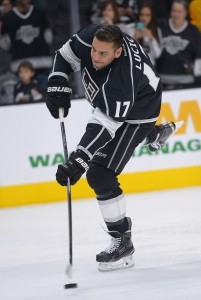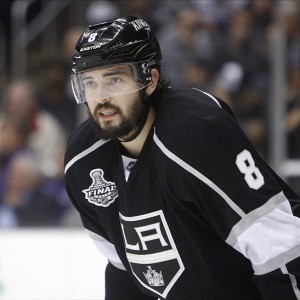Two games into the NHL season and tension is already in the air. For a team that’s hung two banners in the Staples Center (and is narrowly holding off Taylor Swift for second place among its tenants), you would think more patience would be found in Los Angeles’ frigid confines. Not in this town, where success is a requirement. And not with this team, where the Stanley Cup is no longer a mushy dream like traffic-less highways and professional football. The Kings are expected to win and win often, in a manner with so much style and substance that last year’s horrific playoff miss is burned and buried forever from public record.

At least that’s what people expect them to do.
The 2015-16 season started this past weekend, and after two lackluster games it’s clear the Kings have much work to do. A 5-1 drubbing at the hands of the San Jose Sharks was followed up with a sensationally similar 4-1 loss to the Arizona Coyotes. It’s unrealistic to think that an NHL club will win every game, or that a losing streak won’t develop at some point in a season-long journey. But my goodness was that a slow start! You could use the phrase “opening night jitters” to describe why some team might be susceptible to coming out flat on their home ice. In the words of the immortal White Goodman, “spare me.” This team has raised two Stanley Cup Banners in their last three opening nights, and has more than enough of their championship core intact. They know what it’s like to get ready for a big debut at home, on national television, in front of win-thirsty fans. The Kings just didn’t lock-in and perform.
Now not all losses are bad losses, and not all losses are meant to bring down any hope of postseason success for the Kings. Some interesting trends though were on display against the Sharks and Coyotes, and most of them were not promising. At the top of my list is the defensive core, which looked suspect at best. If you saw a number eight black sweater motoring in and out of your TV all weekend, that of course would be Mr. Drew Doughty. Doughty is hogging ice time at alarming levels (27-29 minutes per game easy), testing science’s long-wondered theory of “can a defenseman spontaneously combust?” Head coach Darryl Sutter is not playing Doughty solely because of his elite playmaking ability and vision on the blue line, but rather due to the lack of depth behind his superstar.

Jake Muzzin still has consistency issues (as evidence by his -4 plus/minus rating). Alec Martinez is a solid back-of-the-rotation player. Christian Ehrhoff has been keeping German hockey relevant for over a decade, but so far he’s too aggressive on a team in desperate need of some backline stoppers. Brayden McNabb was scratched on opening night and struggled finding his footing against Arizona. I would never want to get on Matt Greene’s bad side, but at this stage of his career he’s fighting to round out this defensive rotation.
Yet the strangest part of this story is what has to go down as the worst premiere weekend in Los Angeles since that coma-induced Fantastic Four movie came out (just stop trying to figure this one out Hollywood). Defenseman Jeff Schultz played 18 lackluster minutes and had a -2 rating against the Sharks. He was then scratched against the Coyotes and waived two days later (he cleared waivers and is on the Kings’ AHL affiliate). Now I wouldn’t consider myself the president of the Jeff Schultz fan club, but was that really necessary? The defensive unit for the Kings is in full identity crisis mode, struggling to find the proper balance between joining the offensive zone and thwarting opposing attacks. It has even caused their golden boy to struggle at times. A rested Doughty would be sharper, more precise with the puck, and sturdier in front of the net. And as a bonus, he would have two fully functioning lungs come playoff time.
It’s Not Just The Defense
The 0-2 record is not all on the defensive unit. Nick Shore’s beautiful tip-in goal in the opening minutes was apparently check-out time for the Kings offense against the Sharks. This team has set the standard for puck possession in the last half of the decade, but shockingly failed to sustain any pressure against a club that also missed the playoffs last season. Joe Pavelski’s two goals were what the Big Pavelski does as good as anyone in the show. But Joe Thornton scored on a 3-1 with no back-checking at all, and Brett Burns could have shaved half his beard in the time he had to wind up and fire a howitzer into the net. Playing defense is a team game, and the sport of hockey has so many intricate moving parts. Mistakes like these, against elite play-makers and snipers, will lead to lamps being lit and checks in the loss column.
Game 2 was a different story, but a similar one at that. The Kings outshot the Coyotes 41-22, and showed a much more determined focus in the offensive zone. L.A. lost 4-1 in cruel fashion, but in large part due to their inability to finish around the net. Mike Smith was on, and when he’s on it’s basically Donkey Kong. Every Blackhawks fan destroyed the video evidence of what Smith did to them in 2012, and on Saturday the Kings were victims of a hot goalie. But there are ways to break through, ways to create your own bounces, and ways to grind out wins in low scoring games. Jeff Carter and Marian Gaborik are natural goal scorers, and their production is as vital as ever to their team. Anze Kopitar’s finishing touch was just a hair off, which is a crippling blow when the other lines aren’t generating extended scoring opportunities. The longer the Kings fail to find the back of the net in a game, the more doubt creeps in that it may never happen. And the more that doubt creeps in, the more susceptible they are to defensive breakdowns like those that occurred against the Coyotes. The Kings can’t take shifts off early, for if the offense doesn’t find itself at puck drop it may never make it to the dance at all.
Not every aspect of this team’s first two games was meek, and a few signs were even encouraging. Dustin Brown looks rejuvenated, as he revamped his training and diet regimen after having said goodbye to his 20s. Nobody gives this club a greater number of elements than Captain Brown, but he has to increase his scoring for the good of his deprived team (11 goals is not going to cut it in 2015-16). The penalty kill seemed to find itself against Arizona (netting a shorty), and newcomer Milan Lucic had a, shall we say interesting, couple of games. Lucic was the big acquisition of the offseason, as the Kings hoped to add both grit and goal-scoring to their offense. Well, through two games we can certainly check grit off the list. Lucic has one gear: chaos. He might not be the most technically sound player (or even know where he plans on going when he’s out there), but his full-boar attitude has certainly pumped some much-needed adrenaline into the veins of the L.A. offense. There will be some bad moments to say the least, but color me intrigued to watch it unfold. If he figures out the right mix of skill and punishment, God help us all.
Quick Seems Out of Sorts
Of course there’s one person I haven’t mentioned yet, and after two losses it’s no mystery who that person is. Jonathan Quick has been the backbone of this team (and this country!) for nearly six seasons. Peak Quick is an impenetrable fortress that both frustrates and deflates the opposition. Unfortunately for Kings fans everywhere, that guy has yet to make an appearance this season. Several goals in the San Jose game were not his fault, as odd-man rushes were far too frequent and unguarded opposing forwards had free rein to redirect shots in his line of vision. Against Arizona rookie Jordan Weal made the ill-advised decision of skating in front of his own net with no real plan (the equivalent of failing to look both ways when you cross the street), which directly resulted in a goal. Quick hasn’t been sharp, but he hasn’t been nearly as bad as the .833 save percentage indicates. More or less, the Kings netminder has been just OK.
But just OK isn’t who Quick is. Just OK doesn’t steal games from supremely talented rivals, and just ok didn’t make an entire nation of hockey fans questions whether scientists have developed the first octopus-man en route to championship parades down Figueroa street. Quick has to find his edge, hopefully sooner rather than later. He needs to be the guy that makes saves, talks trash, and will say whatever he darn well pleases on live TV. The team will rally around the goalie with arguably the highest ceiling in the world, and it will lead to a better record earlier in the year. Accumulating wins from October to January will set the Kings up so that they don’t have to play Quick every game down the stretch, which if you recall is exactly what happened the last two months of the 2014-15 campaign. Quick was exhausted, much like the team, and the push fell inches from the finish line. That needs to change, and the Kings are certainly aware that it is in their best interests to keep their franchise goalie fresh.
The reality of an NHL season is that it is long. Players sign up for 82 games from October through April, and if they are fortunate they will play an additional 20 plus games into June. Each season has highs and lows that cannot be sustained and will ultimately regress towards the mean, as every coach and member of a hockey locker room understands. The 2015-16 L.A. Kings have lost their first two games. That’s it. There is no need to panic, much like there would be no reason to start making space for a third banner had they started 2-0. The two games are mere case studies in the long grinding season that all 30 organizations have to go through. There is too much talent and resolve to let this season slip away early. The Los Angeles Kings have too many champions with something to say. But it’s time for them to start speaking up.